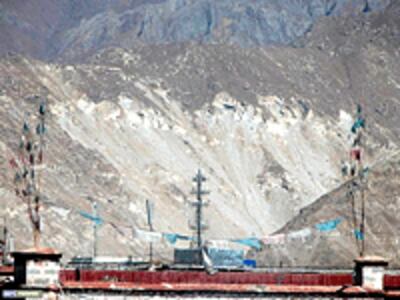
HONG KONG—Talks have resolved a standoff over a planned gold mine in Tibet, but questions remain regarding the disposal of poisonous waste at the site, according to sources in the region.
The dispute over operations at the mine, built by a Chinese firm at a site considered sacred by Tibetans, had continued for weeks, with hundreds of Tibetans protesting the mine’s planned expansion and blocking access to the area.
Both sides agreed June 8 that the mine—which had operated in Markham [in Chinese, Mangkang] county, in the Tibet Autonomous Region’s (TAR) Chamdo prefecture—would cease operations, sources said.
“It was agreed in writing that there will be no mining in the area,” said a local Tibetan man, speaking on condition of anonymity.
“All the Chinese security forces deployed in the area will be withdrawn. The Tibetans who are blocking the road will also return to their respective areas.”
“Chinese authorities will build concrete barriers to block the poisonous residue of earlier mining in the area so that this will not filter down into the drinking water,” he added.
Agreement ‘written down’
All points of agreement were set down in writing in the presence of prefecture- and county-level officials, the source said.
Reached for comment, a local security official confirmed that a settlement had been reached.
“The issue of mining in the area has been resolved, and the area is quiet,” a Markham Public Security Bureau officer surnamed Wang said.
But disagreement remains on the question of handling poisonous waste from the site, Wang said.
“The government has offered to clean the whole area, but the Tibetans want to hold [the residue] as evidence. So it was decided that the Tibetans will hire a professional group from China to examine it, and the government will assign the TAR Environmental Protection Department to carry out its own examination.”
The matter will be referred back to officials at the county, prefecture, and TAR levels if it cannot be finally resolved, he said.
Sacred site
Residents said protests over the proposed mining plans had been under way for three to four months, following local authorities’ approval of plans by Chinese mining and lumbering firm Zhongkai Co. to excavate the area.
Tibetans have historically worshiped at the site, called Ser Ngul Lo [“Year of Gold and Silver”], conducting rituals there in times of drought, residents said.
Pema Thinley, vice chairman of the TAR Communist Party, had been sent to Markham to try to convince the local population to accept the mine, one of the protesters said.
But residents continued to protest, and Pema Thinley was escorted back to Lhasa, the regional capital, on April 5.
On May 16, a contingent of police and security forces arrived, prompting as many as 500 Tibetans to block the road leading to the mine.
Original reporting by Lobsang Choephel for RFA’s Tibetan service and Ding Xiao for RFA’s Mandarin service. Tibetan service director: Jigme Ngapo. Mandarin service director: Jennifer Chou. Translation by Karma Dorjee. Written in English by Richard Finney. Edited by Sarah Jackson-Han.
